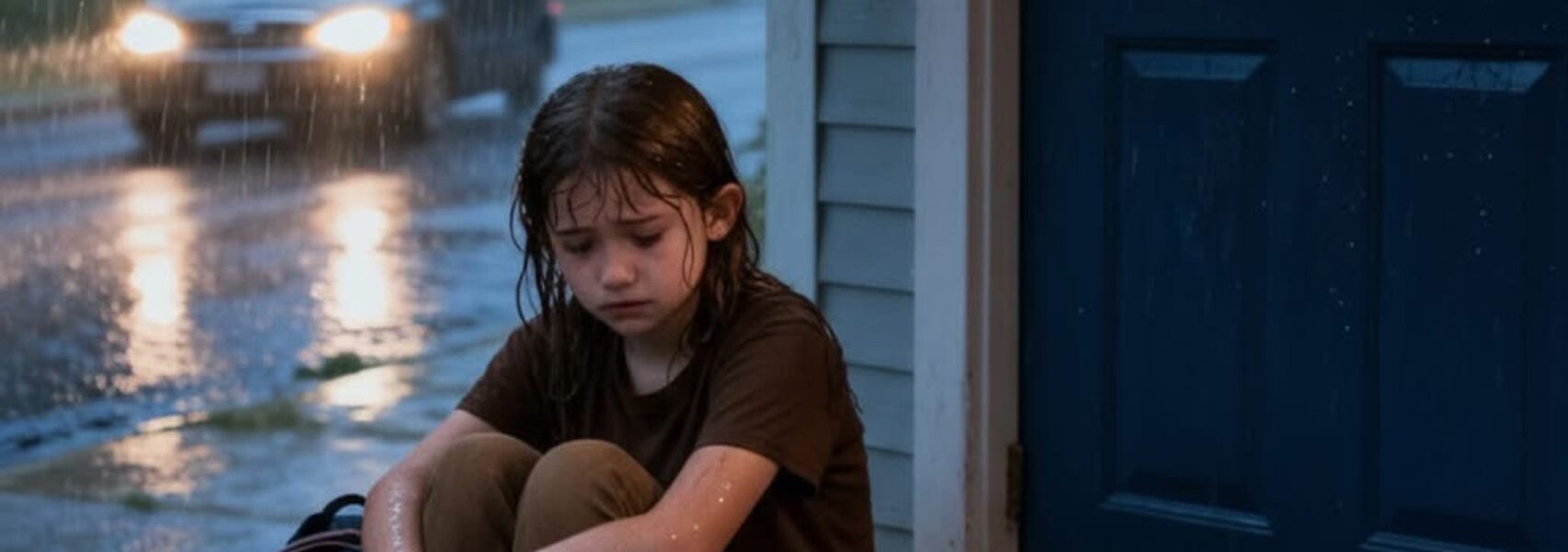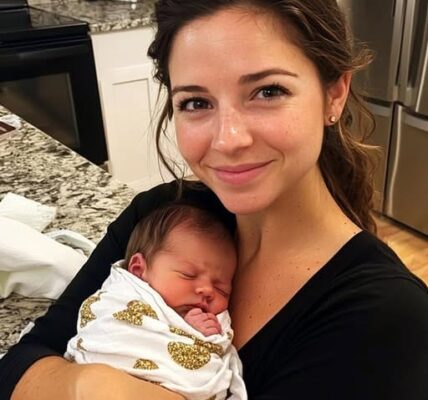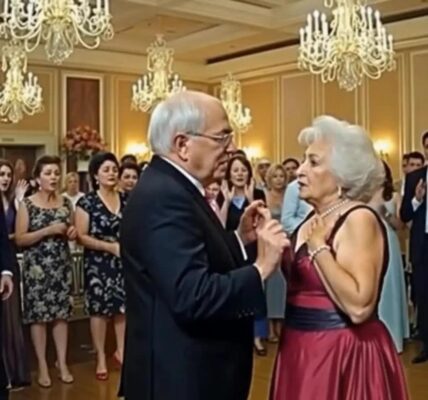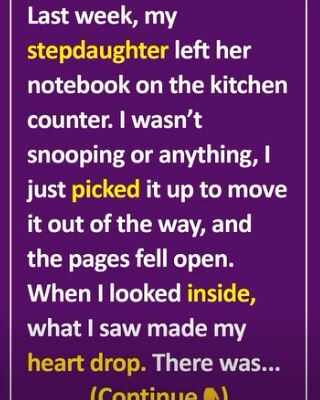“My key doesn’t work,” Hannah said over the phone. Her voice was small. “It won’t go in. I think they changed the lock.”
“Who’s ‘they’?” I asked, already knowing.
“Grandma. Maybe Aunt Brittany.”
I rubbed my forehead. “They wouldn’t do that without telling me. Try calling them again.”
“I did. No one’s answering.”
“Keep trying, honey. I promise someone will open the door soon.” I hung up, convincing myself it was a mistake.
Two hours later, my phone showed four missed calls and one text: Mom, I think they’re here. Please come.
When I called back, I heard her crying. “Grandma said we don’t live here anymore.”
“What?”
“She told me to stop knocking. She said I’m being dramatic.”
A chill crawled through me. “Are you safe?”
“I’m under the porch light. It’s raining.”
“Stay there. I’m coming.”
I didn’t ask permission. I told my supervisor I had a family emergency and walked out before he could respond. Five minutes later, I was driving through the storm, scrubs still damp from sanitizer, hands shaking on the wheel.
By the time I reached the house, night had fallen. Hannah sat on the porch steps, soaked, shivering. I ran to her and wrapped her in my arms. She whispered, “I’m sorry.”
“You have nothing to be sorry for.”
Then the porch light snapped on. My mother stood in the doorway, wine glass in hand. “Elena,” she said, feigning surprise. “What are you doing here?”
“You changed the locks,” I said.
“We needed privacy.”
“You locked my daughter out in the rain.”
“She’s fine. She’s eleven,” she said, taking another sip. “We’ve decided you and Hannah don’t live here anymore. It’s better this way—less tension.”
“We?”
“Brittany and I, of course.” My half-sister appeared behind her, leaning against the doorframe like she was watching a play.
“Mom, maybe this isn’t—”
“Stop,” my mother cut her off. “This has been coming for a while. Elena, you’re an adult. You’ll manage.”
Behind them, Brittany’s kids lounged on the couch. My daughter’s daisy blanket was folded neatly beside them. I went still. No yelling, no tears. Just, “Understood.”
She blinked. “What?”
“You heard me.”
I took Hannah’s hand and walked back to the car.
“Are we going to be okay?” she whispered as I drove.
“Of course.”
“Grandma doesn’t like me, does she?”
“Grandma doesn’t like anyone, sweetheart. Don’t take it personally.”
The silence afterward was heavier than the rain. I wasn’t surprised. When someone shows you who they are long enough, you stop pretending not to see it.
This didn’t start tonight. It started decades ago. There were four of us: Mom, Dad, Brittany, and me. Brittany was five years older and ten times more adored. When she sneezed, Mom fetched tissues and applause. When I did, she told me to do it quietly. Dad was a doctor—mostly absent, mostly tired. But he saw me. That was enough.
At nineteen, I mistook attention for love. A year later, I was pregnant. Two years after that, I was alone. Between diapers and nursing school, I learned that crying in the break room counts as therapy.
When Dad retired three years ago, he tried to make up for lost time. He brought takeout and stories; Hannah adored him. Mom didn’t. Then cancer hit fast and cruel. She called one night, voice trembling. “He needs help, Elena. You’re a nurse.” So Hannah and I moved in. I told myself it was temporary.
For two years, the house felt alive again. Dad was kind, grateful. I ran things like a small hospital. Mom floated through with her glass of wine, pretending to help. When Brittany visited, Mom turned into sunshine. The moment they left, the lights went out again.
Three weeks ago, Dad died. Three days later, Mom was already redecorating. “Fresh energy,” she called it, painting his room pale yellow and hanging photos of Brittany’s kids. Not one of Dad. I overheard her telling Brittany, “Rent’s outrageous. It just makes sense for you to live here full-time. Elena won’t stay much longer.”
I confronted her. She smiled. “You said you were only here for your father. He’s gone. Time to move on.”
Then the lawyer called. “Your father placed the house in a living trust,” he said. “He wanted it to stay with you and Hannah.”
“What do you mean, stay with me?”
“It’s yours. He transferred ownership before his death.”
I didn’t tell anyone. Not yet. I wanted to pick the right time. But five days later, she changed the locks.
By sunrise, rage had replaced shock. I called the lawyer again. “She locked us out.”
“You have the documents?”
“In my car.”
“Come in.”
Ten minutes later, I was in his office. He skimmed the papers. “You’re the trustee. She has no claim.”
“Then fix it.”
He drafted the notice, printed it, and sealed it in an envelope. “Do you want to serve it yourself?”
I laughed. “No. I’ve had enough doors slammed in my face.”
He delivered it. I waited in the car while my mother opened the door, smug at first, until she read the first line. Her face changed. Brittany started yelling. Jonathan, the lawyer, turned and walked back to me. “Served.”
That night, he called again. “She hired counsel. They’re alleging undue influence.”
I laughed. “Taking care of a dying parent is manipulation now?”
“I’m filing for emergency possession,” he said. “The police report will help.”
The report—filed that morning—documented how my mother locked my daughter out in the rain. The officer called it neglect. The judge agreed. Within two days, I had an order of possession.
The eviction was scheduled for 10 a.m. a week later. I arrived early, coffee strong enough to melt steel. Deputies were already at the door when I pulled up. From the sidewalk, I heard shouting.
Mom burst out first, pointing at me. “She forged everything!”
The deputy was calm. “Ma’am, we have a court order.”
Brittany appeared behind her, filming. “This is abuse! You can’t evict a widow!”
“You have fifteen minutes to collect your belongings,” the deputy said.
Mom laughed bitterly. “You can’t be serious.”
They scrambled inside—arguing, crying, slamming doors. When they finally came out, Brittany carried two frames: one of her kids, one of Dad. Mom was last. She stood on the threshold, eyes full of venom. “I hope you’re proud.”
I wasn’t. I was free.
The deputy handed me the keys. “It’s yours now.”
When their cars disappeared, I opened the windows. The air smelled like dust and rain. That evening, I picked Hannah up from school.
“Are we moving again?” she asked.
“Home,” I said.
She ran through the empty rooms, laughing for the first time in weeks. “It’s ours again.”
“Yeah,” I whispered. “It always was.”
Six months later, we haven’t spoken to them. I blocked their numbers. Peace is quiet and strange and good.
I heard through gossip that Mom moved in with Brittany and her husband. It lasted a month. She tried redecorating their place—Ryan didn’t take it well. Cops got called again. He left. Now Mom and Brittany live together, two queens in a crumbling castle, still fighting for the last word.
Meanwhile, Hannah and I plant flowers in the garden. She says everything grows faster when you stop shouting at it. Maybe she’s right. The house is calm. The locks haven’t changed. The storms have passed.
And for the first time in my life, it really feels like home.




